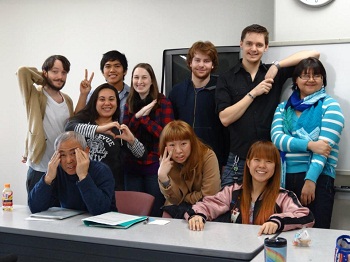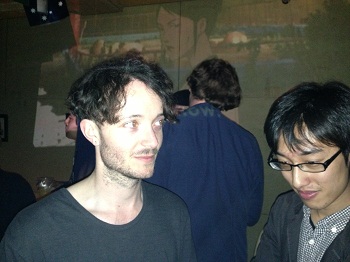| |
|
|
British Association of Monbusho Scholars: From the Field
Guest article by Robert James Simpkins, MEXT Postgraduate Scholarship (2012 - 2014)
Meiji Gakuin University, Tokyo
|
The application window for the 2016-2018 MEXT Postgraduate Scholarship Programme is now open. All applications must be submitted to the Embassy of Japan in London by Wednesday, 10 June 2015 5pm (GMT). For more details, click the following link: http://www.uk.emb-japan.go.jp/en/study/mext_postgrad.html
|
As an anthropology PhD candidate at the School of Oriental and African Studies in London, I was faced with the inevitable task of finding a way to fund my doctoral research in Japan. As students looking to work or study in Japan we are lucky to have a good selection of grants and scholarships to apply for. MEXT Postgraduate Scholarships are among the finest of these, with a structure that encourages awardees to use their time to the very fullest, both academically and personally. I was delighted to be selected for the scholarship, but the actual daily lived experience surpassed all my expectations. Tokyo, my destination for a year and a half, is a dizzying spectacle of urban life beyond comparison. Life within and away from Meiji Gakuin University (at the heart of the metropolis) was exciting and challenging, and opened my eyes to new ways of living in a city. I met many people, made lots of friends, came to know and love my favourite corners of Tokyo, got involved in a local music scene and had experiences i’ll never forget. I learnt to speak pretty decent Japanese and carried out a year of fieldwork which has formed a solid base for my doctoral thesis. In my account ‘From the Field’, I would like to concentrate on a few aspects of my interaction with the MEXT scholarship in order to offer some useful advice to future recipients. In particular, I will address my relationship with my host university as a visiting researcher, Japanese language acquisition, finding private accommodation, and, making the most of my time in Japan as a MEXT awardee.
|
Every university will have a different approach to MEXT students
Whilst there are structural elements to the MEXT scholarship which remain unaffected regardless of where you study, it is good to bear in mind that some universities are more internationally orientated and that some have more established mechanisms in place to deal with us. Applicants to universities such as Waseda or Tokyo University will likely be met with staff boasting years of experience guiding scholars from abroad throughout the duration of their time in Japan. Other institutions may need to learn as they go, having had relatively few MEXT students pass down their hallways. I do not consider either instance to be inherently better or worse, but I would like to stress that the university chosen for affiliative purposes will have an effect on the degree of input or effort required from visiting scholars.
In my case, Meiji Gakuin University in Tokyo was relatively inexperienced at receiving MEXT-sponsored PhD fieldworkers such as myself. Unlike the Masters programme, there was no straightforward bureaucratic path for dealing with me. As a result, I was assigned to a very kind and helpful member of staff in the international department with whom I consulted on all official and university-related matters. I sometimes had requests or questions which couldn’t be answered immediately, but through our regular conversations and emails each issue was resolved over time.
For many students applying to universities via MEXT, the impetus may be on the advantages of a particular course or even a scholar that specialises in your field, rather than the degree of experience the institution has cooperating with the MEXT programme. Therefore, should you find yourself in a position such as mine it is important to remember that patience and regular contact with those looking after you are virtues you would do well to uphold. As both an anthropologist and a research student I imagine that my experience differs somewhat from Master’s students or lab-based scientists, as I spent a lot of time “in the field” away from the university. However, ultimately I found that being more personally involved with the progression of my scholarship in this way gradually deepened my connection with my studies, and with the department on campus.
|
 Gakugei University
Gakugei University |
 Inokashira Park
Inokashira Park |
Understanding the importance of the Japanese language
MEXT scholarship provides the opportunity to learn Japanese whilst in Japan, which is by far the most efficient and enjoyable way to pick up the language. As an anthropology student it was important that I be able to communicate on a conversational level with my informants. This being said, when I arrived in Tokyo in October 2012 I was unable to say more than the most basic of greetings and polite phrases. As Meiji Gakuin University did not provide Japanese classes for research students, I spent the first six months of my scholarship at Gakugei University in West Tokyo. With intensive lessons from morning until lunch time, followed by my own personal study every afternoon, I quickly began to get a hold of the basic tools of the language. As I prioritised Japanese during my studies I also took it upon myself to practice at every possible opportunity, choosing to spend my time with Japanese students and Japanese speaking international students. As a result of these efforts I was able to begin making Japanese friends relatively quickly, which helped me to feel more involved in life on campus and in the city.
Approaching the end of my six months at Gakugei University, I began seeking out ways to continue Japanese classes, fearful that a sudden absence of regular, organised input would hinder my progression. A few friends of mine told me that they were allowed to continue taking Japanese classes at Gakugei University despite having completed their six months of allotted intensive study. I took it upon myself to write a few emails to Meiji Gakuin University, where I was due to be transferred to after completing Japanese training, enquiring about the possibility of taking Japanese classes once enrolled. I was told politely once or twice that this may not be possible, mostly due to the absence of classes designed for my specific MEXT student status. However, after some negotiation and with the support of my host professor, I discovered classes convened for international exchange students from other parts of Asia, Europe and America. With the help of the staff at Meiji Gakuin’s international office, I was put in touch with the school’s Japanese teachers, who happily agreed to accept me into their classes. For a further two full terms I combined morning Japanese classes with afternoons and evenings of research, finding that they complemented each other perfectly.
|
Flat hunting: Finding a home in the city
|
Not all universities in Japan can provide accommodation for MEXT recipients and there are times when students must, or simply prefer to, seek out their own apartments. In my case, Meiji Gakuin could not offer a dormitory as Gakugei University had done, which meant that I was free to take my pick of residential areas and estate agents. As might be expected, flat hunting in Tokyo can be an intimidating experience, especially when you comes across such things as ‘key money’ charges in contracts or realise the limited numbers of landlords who are prepared to take on tenants from abroad. However, even with limited Japanese, or a friend with some language skills, it is still possible to find all kinds of interesting rooms across the city. As my research was primarily conducted around Koenji on the orange Chuo train line, I began visiting estate agents in this area and in Nakano, just 15 minutes walk along the railway tracks. |
 Field work to interview at a music gathering in Koenji
Field work to interview at a music gathering in Koenji
|
As an international student in Japan you have the option of using housing companies that offer a special ‘foreigner friendly’ service, usually conducted in English, or the same estate agents used by the local Japanese residents. Visiting the former presents a limited choice of accommodation based upon a flat search for those landlords accepting foreign residents. By contrast, the local services have by far the widest selection of properties, though you will have to keep your fingers crossed when the estate agent makes a provisional call to the landlord to see whether or not they will accept your request to rent. I tried numerous firms specialising in housing foreigners before, one day on a long walk through Nakano, deciding to call into a local housing service situated down a small side road. With a basic conversational level of Japanese and a little knowledge of the important points to note in Japanese housing contracts, I had found the perfect flat within an hour - a 6th floor tatami (Japanese straw mat) room with a view over Nakano and Shinjuku. Therefore, while it pays to be aware of the difficulties arising when flat hunting in the metropolis, keeping a positive, open mind and being prepared to be flexible means that you don’t need to back yourself into a corner. Don’t be afraid to ask for the help of your friends or associates, or to say that you don’t understand. Living in university accommodation can be reassuring and may in some ways make life easier in Tokyo. Personally however, I found that finding and living in my own place was just the move I needed to get more involved with everyday life in Japan.
|
Making the most of the MEXT postgraduate scholarship
I think it is important to remember that there is no single best way to get the most from a MEXT postgraduate scholarship. Each awardee will experience their time in Japan differently, and so what really matters is to understand what it means to you personally and academically. I put special emphasis on learning Japanese and enculturation as a springboard for doing ethnographic research and setting up my long-term relationship with Japan as an early-career anthropologist. For me, this also included extending my stay for a few months after the scholarship had ended by personally paying school fees to Meiji Gakuin University for a final term. Whilst this meant foregoing a pre-arranged and pre-paid flight back to the UK, I remain convinced that the extra time to conduct participant observation as an official research student was well worth the effort. In many ways, this is a good analogy for the scholarship itself. Whilst it is a cliché to say so, living and studying in Japan is what you make of it. A MEXT scholarship will give you the best resources to make your time a success, but the degree and manner of this depends completely on how prepared you are to meet experiences head on and with an open mind. A sort of positive persistence served me well whilst living and studying in Tokyo; taking responsibility for my own progression and not being afraid to ask for help or advice during those times when I needed it. When communicating with my host university, attempting to prolong my language studies, or when looking for private accommodation, it was important to remember that by extending common courtesies of politeness, patience and understanding, new possibilities can always be reached.
|
|
|
|
| Top |
|
| |
|
|
|
|
| |
|  |
|

